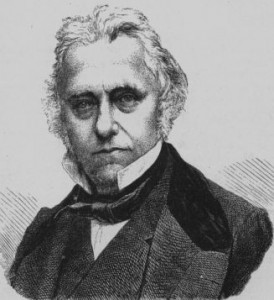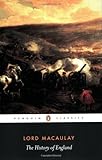What a marvellous name! The family of Macaulay belonged originally to the Scottish highlands. His mother was a brilliant woman of Quaker descent; his father was a business man who was very successful in trade, and appointed at one time governor of the Sierra Leone Colony in Africa, and he spent the whole of his fortune in helping to free the slaves. In consequence, when Macaulay left college he faced the immediate problem of supporting himself and his family.
of the Sierra Leone Colony in Africa, and he spent the whole of his fortune in helping to free the slaves. In consequence, when Macaulay left college he faced the immediate problem of supporting himself and his family.
We should take note of Macaulay’s personal qualities. He read everything from Plato to the cheapest novel, and after reading a book, could recall practically the whole of it after a lapse of twenty years. To this photographic memory we are indebted for the wealth of quotation, allusion and anecdote which brightens every page of his writings. Probably a few of his errors too!
After a brilliant career at college Macaulay began the study of law, which certainly gave a depth and succinctness to his writing, take this description of medieval common law: ‘Our forefathers were by far the best governed people in Europe.. no man was altogether above the restraints of the law, and no man was altogether below its protection’. At twenty-five he gained recognition by an essay on Milton, and after that his progress was uninterrupted. A gifted orator, he was elected to Parliament; he was appointed legal adviser to the Supreme Council of India, in which position he acquired the knowledge that appears in his essays on Clive and Hastings; he became Secretary for War, and was elevated to the peerage as Baron
Macaulay of Rothley. It was, ironically, said of him that he was ‘the only man whom England ever made a lord for the power of his pen’.
With the exception of his ‘History of England’, his writing was done at spare moments, as a relaxation from what he considered more important labours. While at work on his masterpiece, Macaulay died on December 25 1859, and was buried in the place which he liked best to visit, the Poets’ Corner of Westminster Abbey. From the day on which he attracted notice by his Milton essay he had never once lost his hold on the attention of England. Gladstone appropriately summed up the matter when he said, “Full-orbed Macaulay was seen above the horizon; and full-orbed, after thirty-five years of constantly emitted splendour, he sank below it.” But Macaulay’s final words, “Well, I have had a happy life,” feels more suggestive of the man and his work.
Among the best of his literary essays are those on Bunyan, Johnson, Bacon, Goldsmith and Byron; among the historical essays one may sample Macaulay’s variety in Machiavelli and Mirabeau. Careful readers may note a difference between these literary and historical essays. Those on Bunyan, Johnson and Goldsmith, for example, are more finished and more careful of statement than others in which the author talks freely, sharing without measure or restraint “the heaped-up treasures of his memory.” Lays of Ancient Rome and his other verses gained a large public, mainly by virtue of their vigour of movement and strong declamatory quality.
The essays of Macaulay appeared in the magazines of that day, chiefly the ‘Edinburgh Review,’; and official England acclaimed their brilliancy and flooded their author with invitations to dine, but it was not until two years had passed, in 1843, that a London publisher issued the ‘Critical and Historical Essays’, the book which vindicated the taste of readers of that day, becoming immensely popular.
The charm of such a book is evident in the very first essay, on Milton. Here is no critic, airing his rules or making his dry talk palatable by a few quotations; here is a live man pleading for another man whom he considers one of the greatest figures in history. Macaulay speaks eloquently not only of Milton but of the classics on which Milton fed, of the ideals and struggles of his age, of the Commonwealth and the Restoration, in short, of everything which may catch your attention and then focus it on one Titanic figure battling like Samson among the Philistines. It may be that your sympathies are with the Philistines rather than with Samson; but presently you stop objecting and are carried along by the author’s eloquence as by a torrent. His style is the combined style of novelist and public speaker, the one striving to make his characters real, the other bound to make his subject interesting.
That is Macaulay’s way in all his essays. They are seldom wholly right in their judgments; they are so often one-sided that the author declared in later life he would burn them all if he could, he often expressed his own reservations about what should be published, in his ‘History’ he admitted he often composed his narrative from scanty and dispersed material, and hence imperfect; but he is always worth reading, not simply for the subject matter but for the style and for the wealth of illustration with which Macaulay makes dry facts come alive.
Robert Louis Stevenson, writing about Macaulay’s style, observed ‘‘It was probably from a barbaric love of repeating the same sound, rather than any design of clarity that he acquired his irritating habit of repeating words; few writers, indeed, are probably conscious of the length to which they push this melody of letters..(if this was )..writing diligently, and only concern about the rhythm of the phrases, Macaulay was an incomparable dauber.” No doubt the end justified the means, as Macaulay might say.
He loves to select the best and the worst qualities in his subjects, in a manner that would put a contemporary writer in the libel courts, if not protected by the grave. James I, whilst ‘witty and learned in speech’, is ‘a nervous, drivelling idiot’ in action. James Boswell is described as ‘the greatest of biographers and the meanest of men’. He generalizes entertainingly as when describing the Reformation in these terms: ‘Corrupt as the Church of Rome was, there is reason to believe that, if the church had been overthrown (any earlier in England), the vacant space would have been occupied by some system more corrupt still.. she had given too easy admission to doctrines borrowed from the ancient schools.. Roman policy, Gothic ignorance, Greek ingenuity and Syrian asceticism had all contributed to deprave her’.
Macaulay began to write his ‘History of England’ with the declaration that he would cover the century and a half following the accession of James II (1685), and that he would make his story as interesting as any novel. Only the latter promise was fulfilled. His five volumes, the labour of more than a decade, cover only sixteen years of English history; but these are
pictured with such minuteness and such splendour that we can hardly imagine anyone brave enough to attempt to finish the record in a single lifetime. He states his purpose thus: ‘I should very imperfectly execute the task which I have undertaken if I were merely to treat of battles and sieges, of the rise and fall of administrations, of palace intrigues, and debates in Parliament. It will be my endeavour to relate the history of the people as well as the history of the government, to trace the progress of the arts, to describe the rise of religious sects, and the changes in literary taste, to portray the manners of successive generations, and not to pass by with neglect the revolutions in dress, furniture and public amusements. I shall cheerfully bear the reproach of having descended below the dignity of history if I can succeed in painting a true picture of the life of our ancestors’.
Of Macaulay’s masterpiece, we may confidently say three things: that for many years it was the most popular historical work in our language; that by its brilliant style and absorbing interest it deserved its popularity, as literature if not strictly as history; and that, though it contains its share of error and more than its share of personal bias, it has probably as few serious faults as any other history which attempts to cover the immense field of the political, social and intellectual life of a nation. Sir Charles Firth, in 1938, published a Commentary on Macaulay’s “History of England”’, which lists a good many errors and misconceptions, yet properly understood, it forms a tribute quite as much as a criticism. Macaulay would have approved. What might be ideal would be a text, annotated to include the commentary, with clear indication of where he is in error. This may resolve the dilemma of reading, not simply quoting him.
If beginning to read such a work seems daunting, begin with chapter three, ‘The state of England in 1685’, which draws such a picture of England as to rival the best of modern descriptive travel writing. The ‘past is a foreign country’, but in Macaulay’s hands you may step back 325 years and marvel.